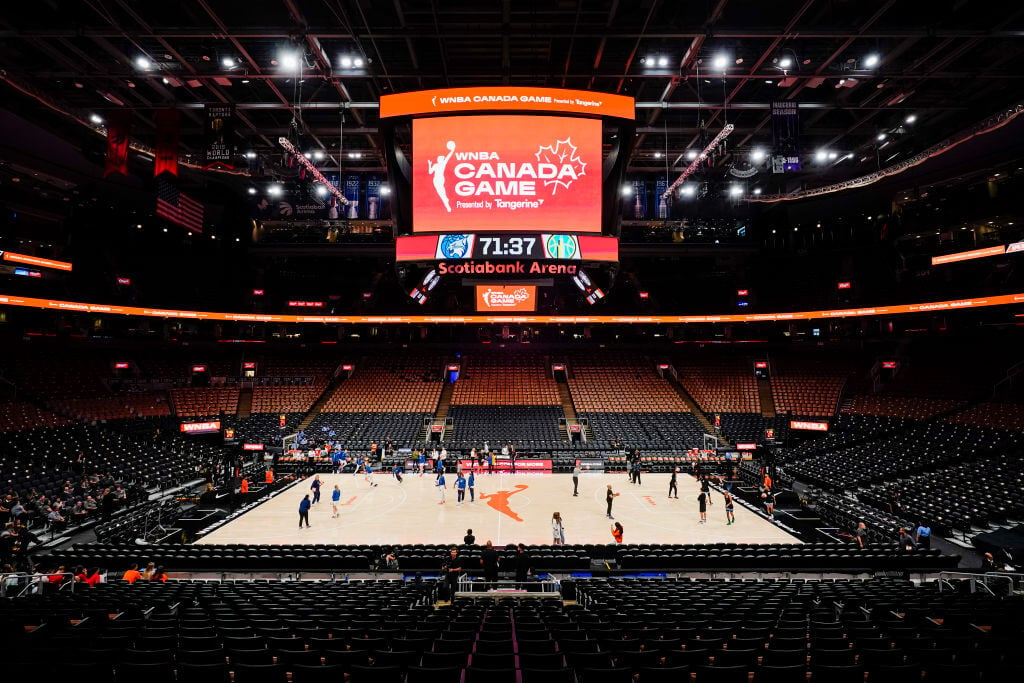Sports
Failure to bring WNBA team to Toronto is concern for Raptors and basketball fans – The Athletic

NBA
The Athletic has live coverage of the WNBA Finals featuring the Las Vegas Aces vs. New York Liberty
BURNABY, B.C. — Bringing a title to Toronto will always be the top line of Masai Ujiri’s resume in the NBA. He has done many great things, with the Raptors, the Denver Nuggets before him and especially with his Giants of Africa charity. Putting together that team, capped with two audacious trades for a pair of likely future hall of famers, is what will linger most strongly for the most number of people.
Advertisement
Not a minor accomplishment, though: making the Raptors relatively normal. To be fair, this started under the tenure of Bryan Colangelo, who brought Ujiri to Toronto, as the director of global scouting, for the first time. Colangelo didn’t win as many of his battles with the Raptors’ corporate ownership structure as his successor, but he saw the Raptors were behind in many facets and started bringing them to the attention of Maple Leaf Sports & Entertainment’s board of directors.
It was Ujiri, who was lured away by new (and brief) MLSE chief executive officer Tim Leiweke, who got the Raptors to modernize. Maybe it took the wasting of Bruno Caboclo’s first year to make it happen, but the Raptors got their own D-League (now G League) team in 2015. They got a new practice facility, OVO Athletic Centre, in 2016, replacing the gym and workout room tucked away on the third floor of Scotiabank Arena. NBA coaching and front office staffs are comically big, but the Raptors’ resources helped balloon the staff size.
When the Raptors fail now, you can point to Ujiri’s decision-making, players failing to fulfill their promise, coaches not getting the most out of their roster, et cetera — normal stuff. The dysfunction is standard issue. Ujiri, the Raptors’ president and vice-chairman, and his counterpart with the NHL’s Toronto Maple Leafs, Brendan Shanahan, largely have control over the operations of their teams. They are accountable to MLSE’s board of directors, but they both have more autonomy than their predecessors. They can succeed or fail on their own merits.
Which is why this week’s report that MLSE declined to aggressively pursue an expansion WNBA team is so worrying. The league announced a new team in the Bay Area on Thursday, with The Athletic reporting the league is also strongly considering awarding an expansion team to Portland. The Toronto Star reported that, among other factors, Edward Rogers’ poor relationship with Ujiri played a part in MLSE’s decision.
Advertisement
Rogers is the chairman of Rogers Communications, one of the three major stakeholders in MLSE, along with Rogers’ main telecom competitor in Canada, Bell, and construction magnate Larry Tanenbaum. The latter is the chairman of MLSE’s board of directors, but reports surfaced in the summer that Tanenbaum is close to selling a portion of his stake to OMERS — the Ontario Municipal Employees Retirement System. (Bell and Rogers have reportedly expressed concern about Tanenbaum selling a portion of his share.) Tanenbaum headed up a group that originally tried to bring an expansion NBA team to Toronto in the early ’90s, eventually working his way to the Raptors when the Maple Leafs purchased the basketball team and the arena then known as Air Canada Centre in 1998.
To be clear, Rogers seems a convenient scapegoat for Toronto not getting a WNBA team. Edward Rogers certainly has a prominent voice within the MLSE board of directors, and three of the board’s eight members have direct ties to the company. However, that still leaves five other board members — three Bell employees, Tanenbaum and Dale Lastman, the chair of Goodmans law firm. If everyone else on the board felt strongly enough about pursuing a WNBA team, MLSE would have done so. Even if Rogers was leading the charge against it, MLSE is, by design, not a dictatorship.
First and foremost, that is too bad for basketball fans in Toronto. There were 19,923 fans at Scotiabank Arena for an WNBA exhibition game between Minnesota and Chicago this past May. The league is as big as it has ever been, and women’s sports are as prominent in culture as they have ever been. Forget the societal argument about the importance of bringing a WNBA team to Toronto; if MLSE doesn’t see having a franchise as a valuable part of its sports portfolio, which also includes Toronto FC, along with other teams and facilities, its thinking seems short-sighted.
This city is clearly ready to support a WNBA team, and hopefully, that can happen, with or without MLSE.
That a personal relationship between part of the ownership group and one of its most famous public-facing employees played any part in reportedly scuttling the attempt is, again, beyond frustrating for people excited for a WNBA team to come to Toronto. It is also worrisome for the teams that are already here under the MLSE umbrella.
Advertisement
Ever since MLSE’s current structure took hold in 2011, when Bell and Rogers teamed up to buy a controlling share of the company, Tanenbaum has been in place as not only something of a swing vote and buffer between the two telecom companies, but also the board member most concerned with the teams’ results. He need not be painted as an altruistic caretaker of the city’s teams, but he clearly cares a lot about winning and losing.
Notably, he has loudly supported Ujiri, whose name has been attached to many prominent openings with more fabled teams around the NBA almost since he arrived in Toronto.
“I know Masai. Masai is like my son,” Tanenbaum said in the locker room of Oracle Arena in 2019, where the Raptors were celebrating their championship. Minutes earlier, ESPN had reported the Washington Wizards were readying an offer for Ujiri to take over basketball operations. “There’s no chance he’s leaving Toronto.”
Since then, Ujiri signed a new contract to remain with the Raptors, believed to afford him even more power, autonomy and certainly money. Tanenbaum was in favour, but it was reported at the time that Rogers fought efforts to retain Ujiri.
This need not be a referendum on Ujiri’s recent work with the Raptors, who are in an uncomfortable position right now. Any top-level sports executive is going to want a lot of power and a lot of money. They should still be held accountable by ownership, but one would hope that personal animus does not get in the way of those assessments.
In The Athletic’s recent survey of Raptors fans, a majority of respondents said they were not very concerned about Tanenbaum selling some of his stake in MLSE. However, it might become the defining story for the Raptors specifically, and basketball interests in general within MLSE. In pro sports, if ownership is uncertain, that trickles down to every part of an organization. In an ownership group with so many interests, it doesn’t take much to upset the balance of things.
(Top photo of Scotiabank Arena before the WNBA exhibition game in Toronto: Mark Blinch/NBAE via Getty Images)
Subscribe to The Athletic for in-depth coverage of your favorite players, teams, leagues and clubs. Try a week on us.
Eric Koreen is the lead Raptors writer for The Athletic. Previously, he has covered the Raptors and the NBA for the National Post, VICE Sports and Sportsnet. Follow Eric on Twitter @ekoreen









